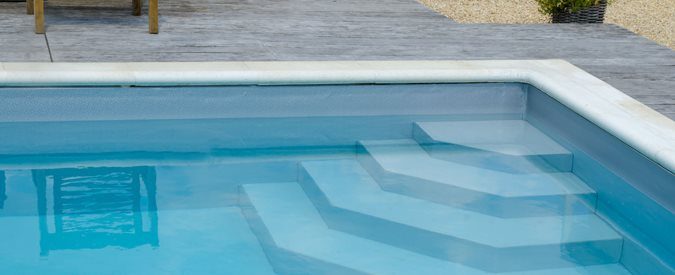Last Updated: February 15, 2023
Compare Saltwater vs Chlorine Pool Cost
Try Our Free Swimming Pool Cost Calculator
Fill out our 30 second free form to receive competitive pricing from pre-screened pool companies. No commitments. Our service is always free!
An Expert Comparison of Saltwater and Chlorine Pools
Saltwater pools were rare just 10 years ago, but lately they’ve exploded in popularity. Pool owners like that they are lower maintenance than chlorine pools and require fewer harsh chemicals.
Still, there are a lot of misconceptions about saltwater pools. Perhaps the biggest is that they don’t contain any chlorine. In actuality, saltwater pools use a generator to convert salt into chlorine, which is necessary for sanitation. The chlorine levels are just lower, which makes the water more comfortable for swimmers. And with saltwater pools, there are no chlorine tablets to buy or add.
Another major misconception about saltwater pools is that they’re as salty as the ocean. In truth, the salt content is about 10 times lower - similar to that of natural tears.
How Much Does a Saltwater Swimming Pool Cost?
The distinguishing factor between a saltwater pool and a chlorine pool is the existence of a chlorine generator. In order to have a saltwater pool, you need to spend about an extra $1,000 on a generator. You’ll also have to spend about $20 each year for salt, but you won’t have to purchase chlorine, which is more expensive.
Saltwater Pool Pros
- Increased comfort - Saltwater pools provide a more comfortable swimming experience because they contain less chlorine. The water is softer on the skin, and it is less likely to cause itching, burning, dry skin, green hair or swimsuit fading. You can open your eyes underwater without irritation. Most people who opt for saltwater pools do so for the increased comfort.
- No chlorine to buy - Because saltwater pools produce chlorine using a generator, you will never have to worry about purchasing, transporting and adding chlorine to the pool.
- Self-regulating - The generators in saltwater pools produce a steady flow of chlorine at all times, whereas chlorine pools require regular chlorine treatments to maintain appropriate levels. The steady flow of chlorine reduces algae build-up and maintains a reliable, even level of cleanliness.

Try Our Free Swimming Pool Cost Calculator
Fill out our 30 second free form to receive competitive pricing from pre-screened pool companies. No commitments. Our service is always free!
Saltwater Pool Cons
- Price - Saltwater pool systems are more expensive to install.
- Maintenance costs - Metal parts and components will have to be replaced more often because salt has corrosive tendencies. Also, salt chlorination cells need to be inspected about once every three months and replaced every two or three years.
- Harmful to plants - Saltwater can kill plants and rob nearby soil of important nutrients. Because of this, some (but not many) cities and towns ban saltwater pools.
Chlorine Pools Overview
When first shopping for a pool, most people assume that chlorine is the only way to go. Consumers are more familiar with chlorine pools, so they remain the most popular choice.
Chlorine is a powerful chemical that instantly kills harmful bacteria. It is completely safe when used appropriately. With a chlorine pool, you will need to buy chlorine tablets and add them on a regular basis to maintain the pool’s proper chemical balance.
How Much Does a Chlorine Swimming Pool Cost?
You’ll save about $1,000 upfront by opting for a chlorine pool because there’s no chlorine generator to buy. Chlorine pools are also less expensive to maintain because the parts and components are less likely to fail. However, you will have to purchase buckets of chlorine on a regular basis, which are more expensive than salt.
Chlorine Pool Pros
- Cost - Chlorine pools are less expensive upfront and cost less to maintain, even when you factor in the cost of purchasing chlorine. This is largely because you don’t have to purchase a chlorine generator.
- Familiarity - If you have a pool, chances are it’s a chlorine pool. You’ve learned how to properly maintain the chemical balance. Switching to a saltwater pool involves a bit of a learning curve because the maintenance regimen is different.
Chlorine Pool Cons
- Irritation - We’re all familiar with chlorine’s irritating qualities. Chlorine causes itching, burning, dry skin, green hair and swimsuit fading. It can be uncomfortable to open your eyes underwater.
- Maintenance - Without a generator to create chlorine and regulate chlorine levels, you’re in charge of maintaining the proper balance. You’ll need to add chlorine on a regular basis and monitor chlorine levels. You will also need to perform periodic “shock” treatments to prevent algae growth and regulate chlorine levels.
Find the Best Swimming Pool Pros Who Will Compete for Your Business
Try Our Free Swimming Pool Cost Calculator
Fill out our 30 second free form to receive competitive pricing from pre-screened pool companies. No commitments. Our service is always free!
Try Our Free Swimming Pool Cost Calculator
Fill out our 30 second free form to receive competitive pricing from pre-screened pool companies. No commitments. Our service is always free!